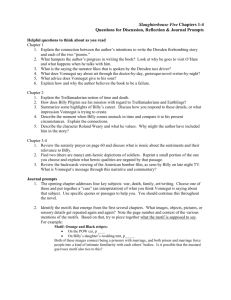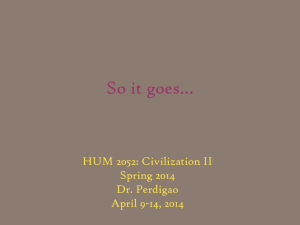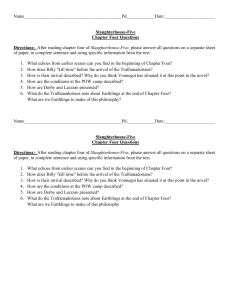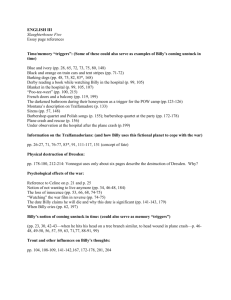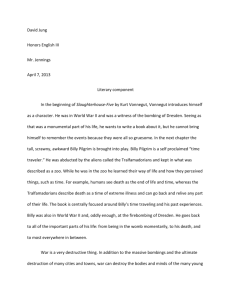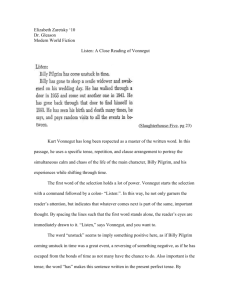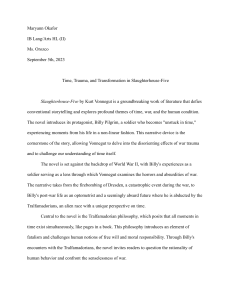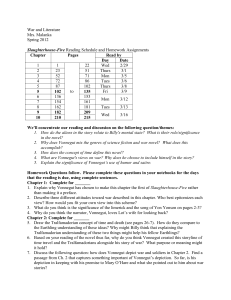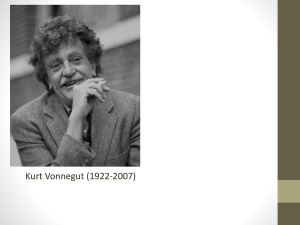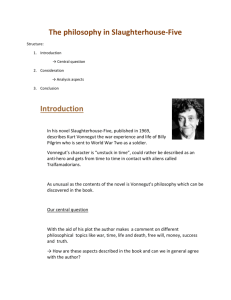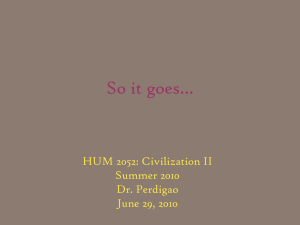Themes: Slaughterhouse Five From Novels for Students Kurt
advertisement
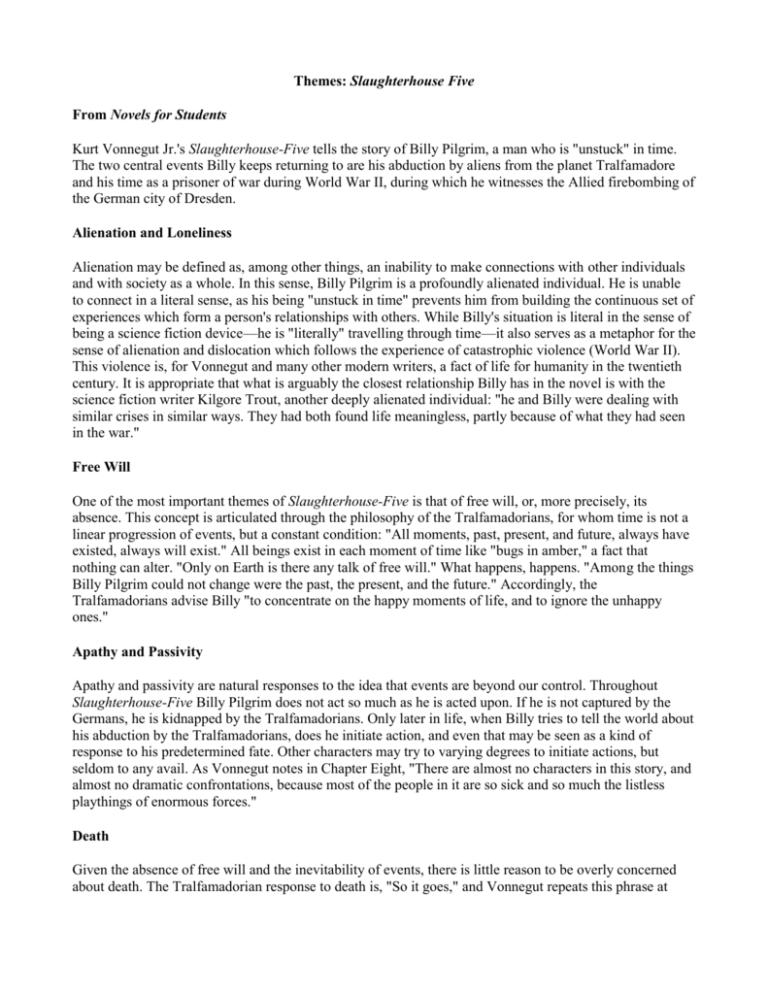
Themes: Slaughterhouse Five From Novels for Students Kurt Vonnegut Jr.'s Slaughterhouse-Five tells the story of Billy Pilgrim, a man who is "unstuck" in time. The two central events Billy keeps returning to are his abduction by aliens from the planet Tralfamadore and his time as a prisoner of war during World War II, during which he witnesses the Allied firebombing of the German city of Dresden. Alienation and Loneliness Alienation may be defined as, among other things, an inability to make connections with other individuals and with society as a whole. In this sense, Billy Pilgrim is a profoundly alienated individual. He is unable to connect in a literal sense, as his being "unstuck in time" prevents him from building the continuous set of experiences which form a person's relationships with others. While Billy's situation is literal in the sense of being a science fiction device—he is "literally" travelling through time—it also serves as a metaphor for the sense of alienation and dislocation which follows the experience of catastrophic violence (World War II). This violence is, for Vonnegut and many other modern writers, a fact of life for humanity in the twentieth century. It is appropriate that what is arguably the closest relationship Billy has in the novel is with the science fiction writer Kilgore Trout, another deeply alienated individual: "he and Billy were dealing with similar crises in similar ways. They had both found life meaningless, partly because of what they had seen in the war." Free Will One of the most important themes of Slaughterhouse-Five is that of free will, or, more precisely, its absence. This concept is articulated through the philosophy of the Tralfamadorians, for whom time is not a linear progression of events, but a constant condition: "All moments, past, present, and future, always have existed, always will exist." All beings exist in each moment of time like "bugs in amber," a fact that nothing can alter. "Only on Earth is there any talk of free will." What happens, happens. "Among the things Billy Pilgrim could not change were the past, the present, and the future." Accordingly, the Tralfamadorians advise Billy "to concentrate on the happy moments of life, and to ignore the unhappy ones." Apathy and Passivity Apathy and passivity are natural responses to the idea that events are beyond our control. Throughout Slaughterhouse-Five Billy Pilgrim does not act so much as he is acted upon. If he is not captured by the Germans, he is kidnapped by the Tralfamadorians. Only later in life, when Billy tries to tell the world about his abduction by the Tralfamadorians, does he initiate action, and even that may be seen as a kind of response to his predetermined fate. Other characters may try to varying degrees to initiate actions, but seldom to any avail. As Vonnegut notes in Chapter Eight, "There are almost no characters in this story, and almost no dramatic confrontations, because most of the people in it are so sick and so much the listless playthings of enormous forces." Death Given the absence of free will and the inevitability of events, there is little reason to be overly concerned about death. The Tralfamadorian response to death is, "So it goes," and Vonnegut repeats this phrase at every point in the novel where someone, or something, dies. Billy Pilgrim, in his travels through time, "has seen his own death many times" and is unconcerned because he knows he will always exist in the past. Patriotism The world as depicted in Slaughterhouse-Five is a world in which patriotism twists into nationalism and militarism and becomes an excuse for acts of violence and mass destruction. Those who claim to be patriots, such as "Wild Bob," the American prisoner of war who gives speeches to imaginary troops, or Bertrand Copeland Rumfoord, an Air Force historian who defends the Dresden raid, are deluded at best and malevolent at worst. More realistic is the reaction of the German soldiers in Dresden to the American prisoners: "There was nothing to be afraid of. Here were more crippled human beings, more fools like themselves." War and Peace Slaughterhouse-Five deals with many different themes, but it is most of all a novel about the horrors of war. For Vonnegut, war is not an enterprise of glory and heroism, but an uncontrolled catastrophe for all involved, and anyone who seeks glory and heroism in war is deluded. Although World War II is regarded by most as a justified conflict which defeated the genocidal regime of Nazi Germany, Vonnegut sees only victims on all sides, from the American soldier executed by the Germans for looting to the 135,000 German civilians killed in the Allied firebombing of Dresden. The horrors of the war are so overwhelming that Vonnegut doubts his ability to write about them. Speaking directly in the first chapter, he says of the novel, "It is so short and jumbled and jangled … because there is nothing intelligent to say about a massacre." The only response to the nightmare of war is a profound alienation and distancing, made literal by Billy Pilgrim's being "unstuck in time." Appropriately, Billy's condition offers the most striking image of peace in the novel, as he becomes unstuck in time while watching a war movie on television and sees it backwards: The bombers opened their bomb bay doors, exerted a miraculous magnetism which shrunk the fires, gathered them into cylindrical steel containers, and lifted the containers into the bellies of the planes…. The steel cylinders were taken from the racks and shipped back to the United States of America, where factories were operating night and day, dismantling the cylinders, separating the dangerous contents into minerals … [which] were then shipped to specialists in remote areas. It was their business to put them into the ground, to hide them cleverly, so they would never hurt anybody ever again. Science and Technology Although Slaughterhouse-Five does not deal as directly with issues of science and technology as do other Vonnegut novels such as Player Piano and Cat's Cradle, the limitations of technology remain an important theme. The destruction of World War II would not have been possible without "advances" in technology (the long-range bombers that destroyed Dresden; the poison gas used on concentration camp inmates). And the extraordinarily advanced technology of the Tralfamadorians not only cannot prevent the end of the Universe, but actually causes it: "We [Tralfamadorians] blow it up, experimenting with new fuels for our flying saucers."
